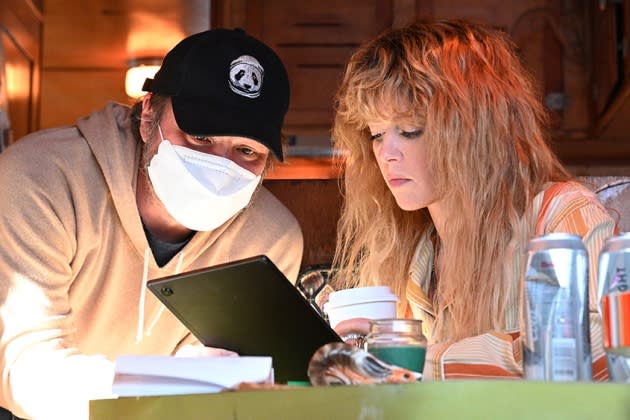Rian Johnson and More Film Directors Helming Emmy-Contending TV Shows
- Oops!Something went wrong.Please try again later.
- Oops!Something went wrong.Please try again later.


I’ve been doing this long enough to remember the days when film folks saw doing TV as a bit of a step down, or a one-time novelty — and even TV folks felt like they were in the minors, waiting for that call to join the movie big leagues. That hasn’t been the case for a while, and I like to needle my film colleagues with the now-established fact that TV is where it’s at. The rise of streaming just cemented that.
It’s still fun, though, to chat with creatives who have spent most of their career in film, and hear about their experiences in working on TV series. Inevitably, they must admit that working in TV was both gratifying — and perhaps the hardest thing they’ve ever done.
More from Variety
“Knives Out” filmmaker Rian Johnson, for example, wasn’t a stranger to TV when he started working on Peacock’s “Poker Face.” He directed two of the most memorable episodes of “Breaking Bad,” 2010’s “Fly” and 2013’s “Ozymandias,” and also had helmed an episode of “Terriers.” He knew TV came with a lot of work. But dropping in as an episodic director vs. actually creating a show of your own was worlds apart.
“There’s no way I could have anticipated how all-absorbing the task would be,” he tells me. “I think the thing that I had been told but that you can’t really know until you experience it, is just the overwhelming constant tidal wave of stuff to do. Whether it’s working with the writers, working with the directors, little decisions on this, on post, on sound, it’s everything. It’s not like shooting a movie that has a six month schedule. It really is like shooting 10 independent films all at the same time.”
Listen, after hearing film folks for years coming to TV and saying they’re shooting “ten-hour movies,” I like Johnson’s comparison to making ten separate movies instead. The payoff is huge, and Johnson admits he’s now a bit addicted. “I always had a slow food approach to making movies and it is actually really invigorating to speed up,” he says. “There’s something very dangerously kind of mouse-with-the-pleasure-button-ish about that.”
Johnson relied on showrunners Nora Zuckerman and Lilla Zuckerman to keep “Poker Face” moving. Another filmmaker diving deep into TV this year was “Extrapolations” creator Scott Z. Burns, who took the leap as creator on his Apple TV+ series.
Burns had previously directed episodes of “Californication” and “The Loudest Voice,” but this would be the biggest TV project yet for the writer behind films such as “Contagion” and “The Bourne Ultimatum.”
“Sometimes I think it’s beneficial to not know what you’re getting yourself into,” Burns says now. “It was a lot of plates spinning and juggling.” Part of that was the ambition of putting together a series that jumped around different timeframes and locations, with different casts. Filming it all in New York made it a bit easier logistically, but Burns says diving into showrunning was “its own really specific world.”
For advice, he turned to another filmmaker who experienced his own growing pains in moving from film to TV: “I started calling Steven Soderbergh asking, is something I really want to do? And he said, ‘I think you’re gonna love it.’ Because I never liked being in the writer box. I always wanted to be more involved in the overall production. Writing and directing was great. And producing becomes something that is helpful to getting people to understand your vision. At that point, if you’re writing, directing, and producing, you’re about halfway to showrunning.”
It’s the other half of showrunning — the management, the budget, the less creative things — that can consume you. Burns found out the hard way: He had put off writing the finale of “Extrapolations,” figuring he’d find time on the weekends. Once production began, there were no “weekends.”
“It was a little white knuckle flying for a bit,” he says. But Burns and his team found a way to finish it.
TV: It’s the true big leagues.
Best of Variety
Sign up for Variety’s Newsletter. For the latest news, follow us on Facebook, Twitter, and Instagram.
